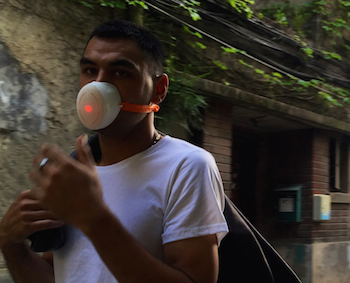 Sendinaden Pattern Breathe Mask
Sendinaden Pattern Breathe Mask
Pharma company Bayer HealthCare has announced the next five startups that will take part in the company's Grants4Apps accelerator program in Germany.
Startups in Bayer's f0ur-month accelerator receive around $58,031 (50,000 euros) and coaching from Bayer executives as well as other industry experts.
The accelerator's first class was announced in August last year. Startups in that program included a company working on wearable health sensors for clinical use, another developing a smart pill bottle with a connected app, and one working on non-contact vital signs monitoring systems for home use.
"We are excited that the 'Grants4Apps Accelerator 2015' program is so well accepted," Johannes Schubmehl, chief information officer at Bayer HealthCare, said in a statement. "The number of applications for this year's round has tripled compared to last year. With our 'Accelerator' program we create an environment in which to advance digital innovation in healthcare. We are looking forward to supporting the five digital health startups to further develop their innovative projects."
Last year Bayer HealthCare received more than 70 applications, while this year the accelerator received around 200. Additionally, this year Bayer encouraged its own employees to submit startup ideas to the program. Bayer HealthCare judged the applications based on maturity, existing product prototypes, and the applicant's fit to Bayer's areas of interest.
Here are the five companies in Bayer HealthCare's 2015 accelerator:
US-based Serona offers researchers and healthcare professionals a tool for hormone testing and data management. The service helps women who are on hormonal prescriptions track insights from their medications over time. Serona was co-founded in 2014 by Heather Bowerman, a biomedical engineer from UC Berkeley and Harvard, and Brandy Houser, who has a PhD from Harvard in immunology. Houser previously managed Pfizer alliances for the Partners Healthcare System in Boston and Bowerman is an ex-McKinsey consultant as well as former White House science and technology policy associate.
Estonia-based MediKeep has developed a medication management app. The offering allows users to keep an inventory of all their medicines by scanning the barcodes or searching a database so that they can keep track of expiration dates and remaining quantities. The app also offers a pill reminder feature with notifications. MediKeep will eventually provide users with profile-based suggestions for home medicine, conflicting drug alerts, simplified medicine information sheets, and an option to view taken medicine.
Sendinaden Limited, founded by Bayer employees in China, is developing 3D printed smart wearable devices that help city-dwellers build better habits. Sendinaden explains that in Asia, city-dwellers deal with environments that are both polluted and stressful. The company's first product, called the Pattern Breathe Mask, is customized to each user and improves users' health by changing breathing patterns. This device is expected to launch globally January 2016. Sendinaden also plans to develop other products, including one that will diagnose and treatment of sleep apnea and others focused on drug delivery and pulmonary rehabilitation.
Germany-based Viomedo connects patients with clinical trials. The online platform aggregates 2,000 clinical trials that are open for patients in Germany. It also provides them with the information they need in order to consider participating in a clinical trial as a therapeutic option.
Canada-based Vitameter has developed a handheld device that analyzes users' vitamin levels from a drop of blood. The company explains that the user experience for the device is similar to that of glucometers. Vitameter aims to eventually expand to other biomarkers and provide users with the information they need to quantitatively understand their health.













